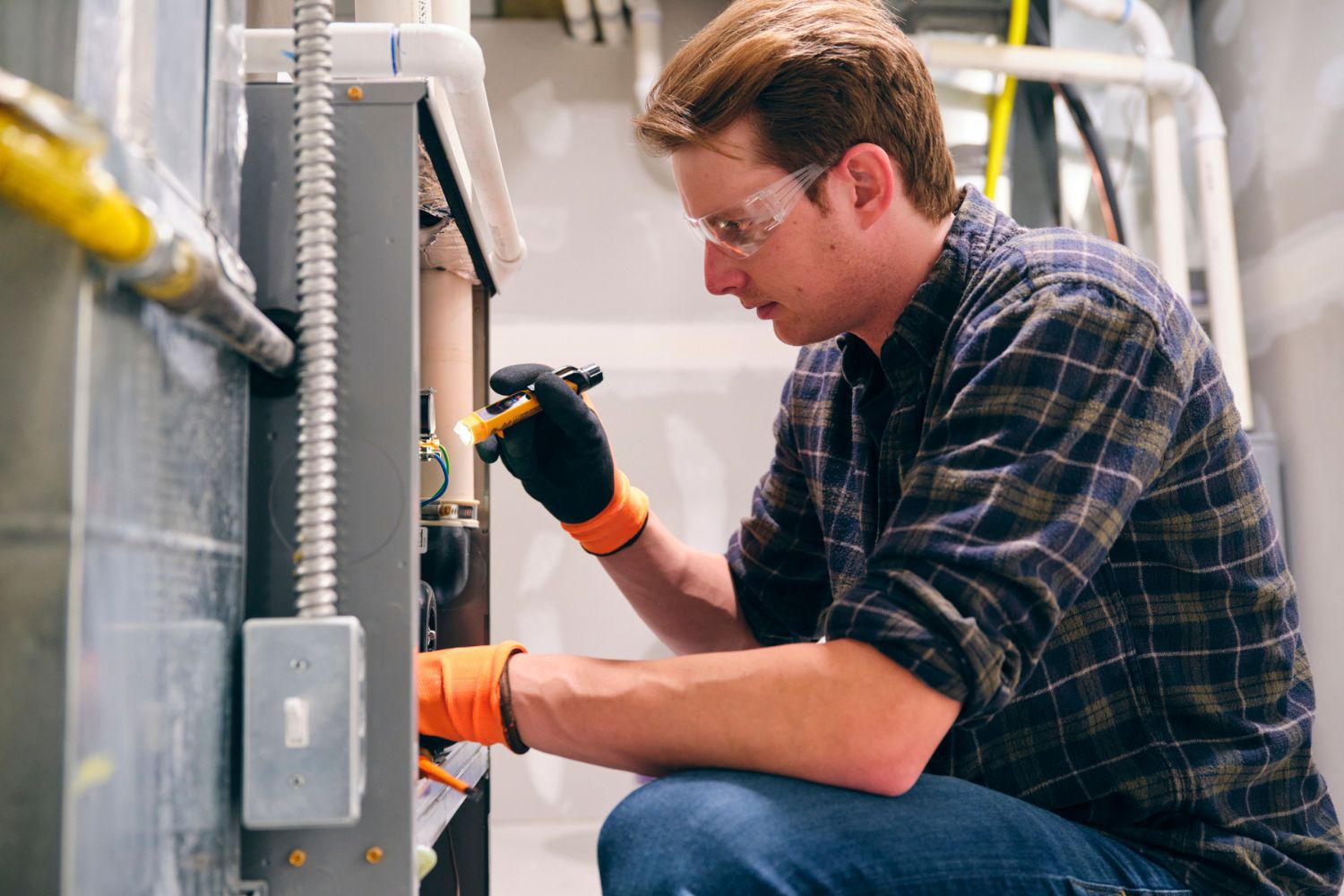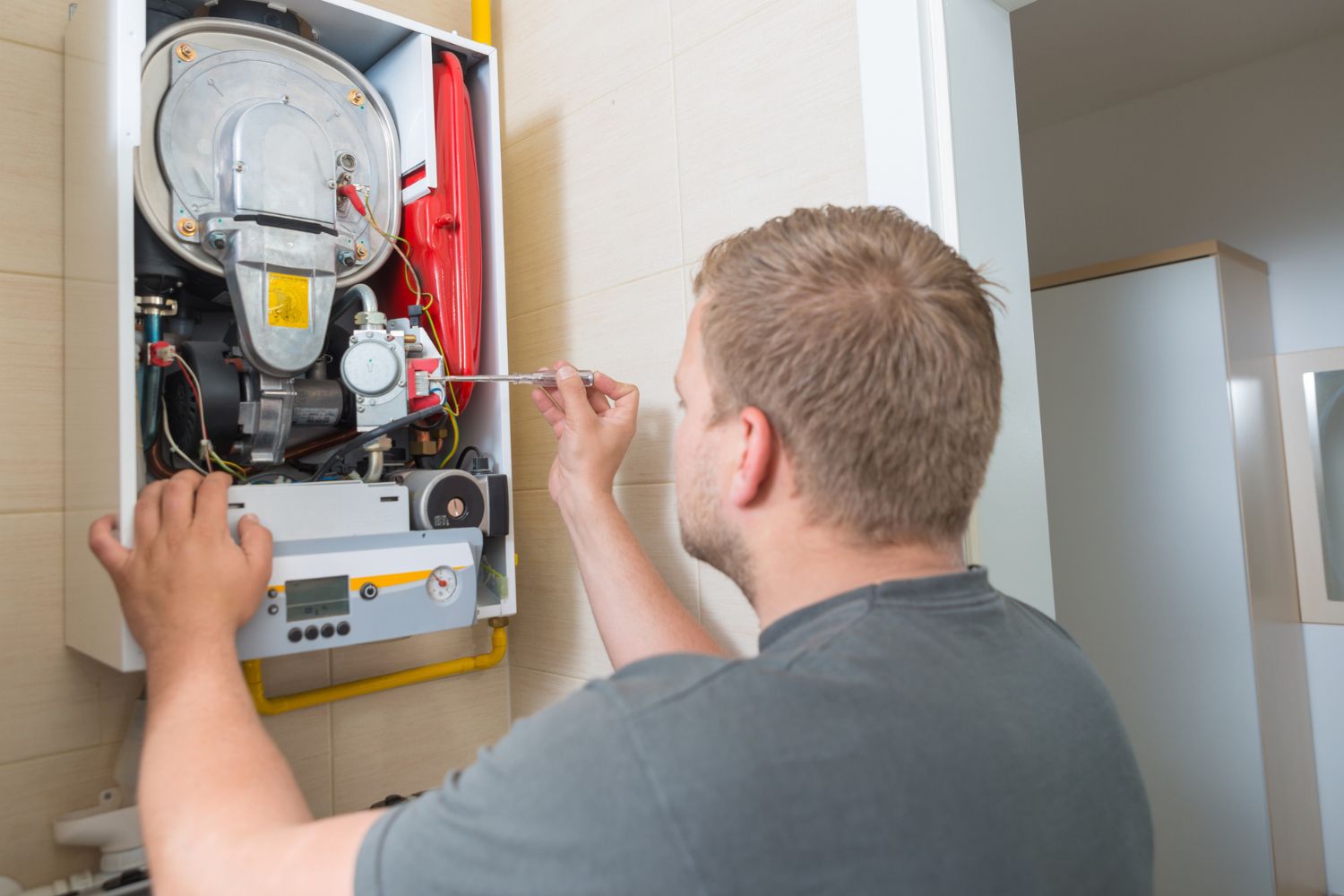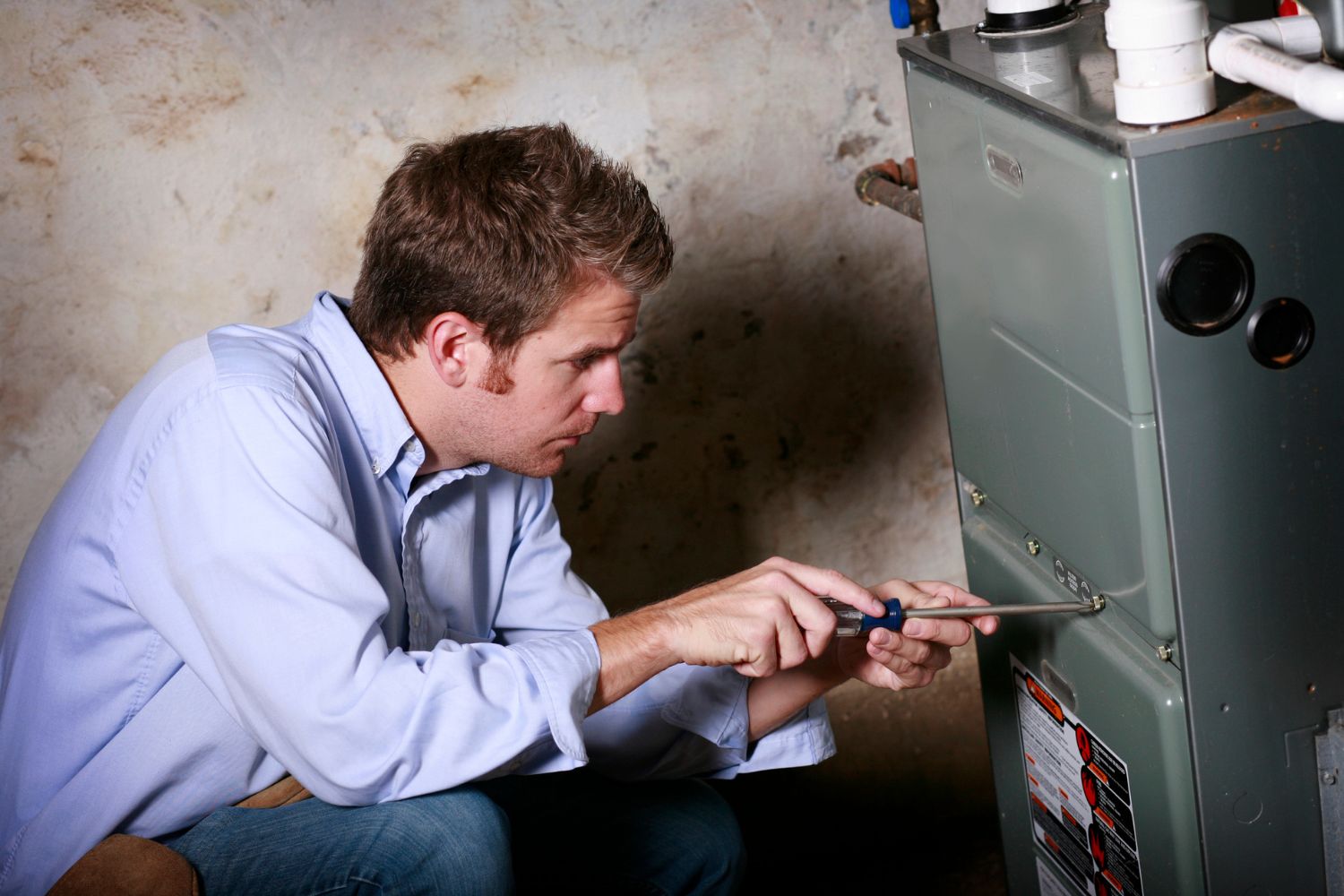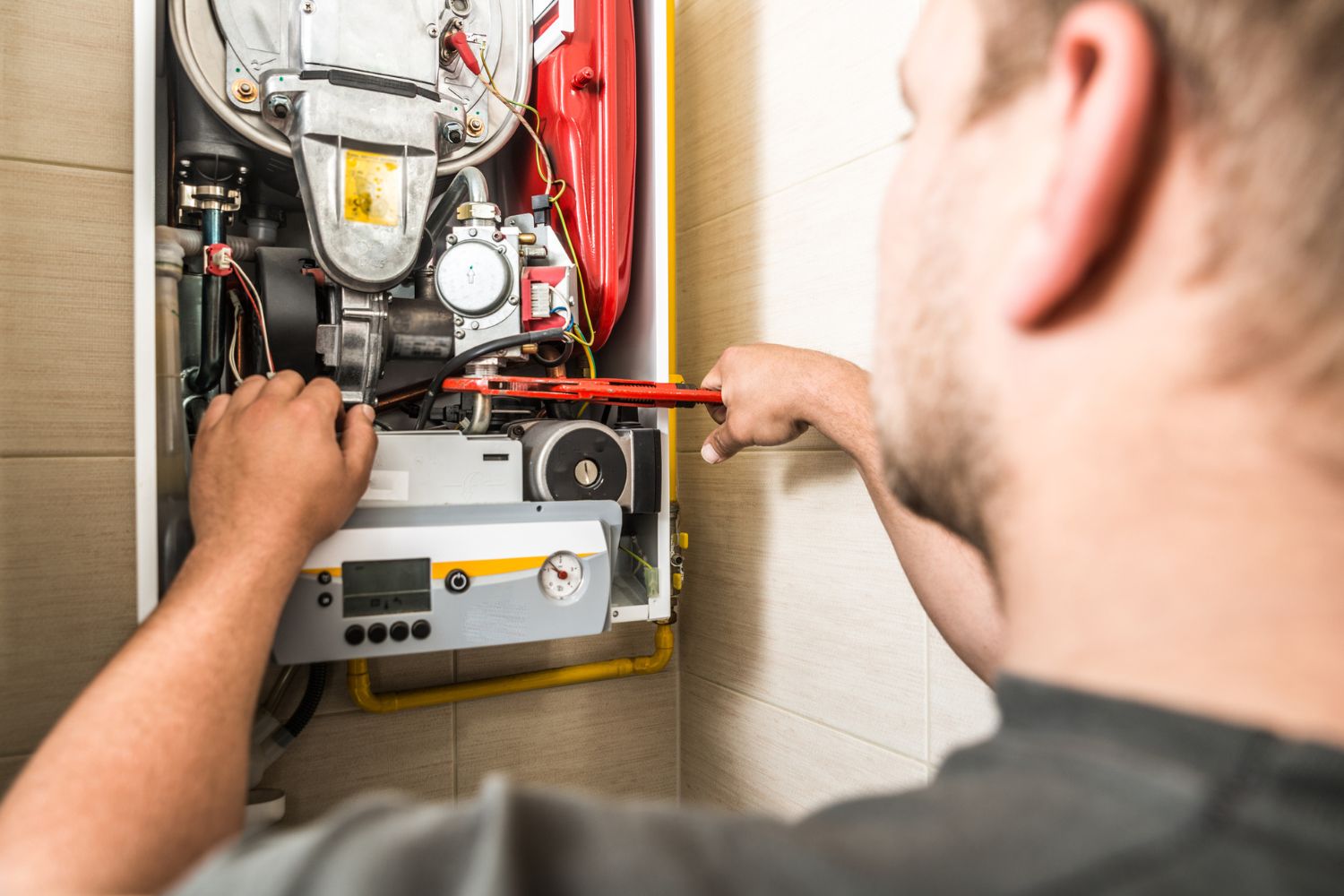We may earn revenue from the products available on this page and participate in affiliate programs. Learn More ›
- Typical Range: $100 to $200
Furnaces produce heat to keep a house warm even on the coldest of nights. Just as a furnace takes care of the residents of a home, it’s equally as important for those residents to take care of their furnace. Experts recommend that homeowners schedule an annual furnace tune-up to keep their furnace running in tip-top shape. What is a furnace tune-up? A furnace tune-up includes an inspection and cleaning of all furnace parts along with any necessary repairs. Keeping up with annual tune-ups ensures a furnace will perform efficiently and last as long as it should.
How much does a furnace tune-up cost? According to HomeAdvisor, the cost ranges from $100 to $200, depending on the type of fuel the furnace uses, the cost of an inspection, the amount of cleaning required, the need for a filter change, and the labor cost to service the furnace. The price can increase if any furnace repairs are required or if the homeowner also opts to have their air ducts cleaned. A home warranty may help cover the cost, or the homeowner can purchase an annual maintenance plan through one of the best HVAC companies. This guide will cover the factors that go into the furnace tune-up cost, the pros and cons of DIY vs. professional service, the ways homeowners can save money on their furnace service visit, and the questions they can ask professionals before hiring a furnace inspection company near them.
Factors in Calculating Furnace Tune-Up Cost
Experts recommend an annual furnace tune-up to keep the system in tip-top shape and functioning properly. The following factors play a role in the overall cost of a furnace tune-up, including the furnace’s fuel type, the level of inspection, and the costs associated with cleaning, filter replacement, and labor.

Fuel Type
Furnace inspection and tune-up cost varies depending on whether the furnace uses gas, oil, or electricity as fuel. Gas and oil furnace tune-ups are more involved due to the advanced system parts. A gas furnace tune-up will cost anywhere from $80 to $170, and an oil furnace tune-up will cost anywhere from $100 to $200. Electric furnace tune-ups are a little less expensive, ranging from $70 to $130. Each tune-up will involve an inspection and cleaning of all of the parts, but only the gas and oil furnace tune-ups require fuel line or tank inspections, which accounts for their higher costs.
Inspection
The furnace inspection is a crucial part of the tune-up process. During the inspection, a technician will examine all of the parts to ensure they are functioning properly and will continue to function throughout the cold season. Furnace inspection cost ranges from $70 to $130 for a standard inspection. This includes an inspection of each system component along with a diagnostic report that details the findings. An advanced inspection will cost closer to $130 to $200. This also includes the inspection and diagnostic report, but it adds a full furnace tune-up, filter changes, and basic system cleaning.
Cleaning
How much is a furnace cleaning? While a basic inspection includes some minor cleaning, furnace tune-ups offer more in-depth cleaning. Every part of the system will be cleaned. Parts that can be removed will be taken out for cleaning, then put back into place. Delicate sensors and electrical components will also be cleaned. While this type of service is not recommended every year like an annual tune-up, it could be a good idea to request an in-depth clean every few years to keep the system in good shape.
Filter Replacement
A furnace filter captures any dust and dirt circulating in a furnace and throughout the air ducts. Regularly replacing the filter improves indoor air quality, which can be especially important if any residents suffer from ailments such as environmental allergies or asthma. The average cost of furnace tune-up includes the cost to replace the furnace filters. Replacing a filter is fairly simple as long as the homeowner knows what size filter to buy and where it is supposed to be installed. Many homeowners forget to replace their filters according to the recommended schedule, so it can conveniently be done during the annual furnace tune-up. Homeowners can purchase a filter themselves for $10 to $30 or have the furnace inspection company buy one for them and include it in the overall tune-up cost.
Labor
Labor makes up most of the AC and furnace tune-up cost. The technician will run through a furnace tune-up checklist to make sure the entire furnace is properly cleaned and inspected during the process. While the labor costs will likely not be broken out from the total cost, homeowners can expect to pay between $75 and $125 per hour for an HVAC technician to complete the tune-up. The work will typically take about 1 to 2 hours, assuming there are no repairs that need to be made; if any are required, this will add to the total tune-up time and will therefore increase the total labor cost.

Additional Costs and Considerations
While not always applicable, there are several cost factors that could increase or decrease the total cost of a furnace tune-up. Any necessary repairs and added air duct cleaning will increase the cost, although a furnace maintenance plan or warranty policy could decrease what the homeowner will need to spend.
Repairs
During a furnace tune-up, the HVAC technician may come across broken or worn parts that need to be replaced. The average cost of furnace repairs ranges from $100 to $600. There are dozens of parts that could need to be replaced on a furnace, from the blower motor to the heat exchanger to the ignitor. The total repair cost will include both the part and the labor. An HVAC technician typically charges $75 to $150 per hour, but if the service is requested after hours in an emergency lack-of-heat situation, homeowners can expect to pay closer to $140 to $210 per hour. If the required furnace repairs equal more than 30 percent of the cost of a new furnace, replacing the furnace entirely is often a better investment.
Air Duct Cleaning
While air ducts are not necessarily part of the furnace, some homeowners request an air duct cleaning as part of their annual furnace tune-up. Not all furnace companies offer this service, so the homeowner may have to hire a separate company to clean their ducts. Air duct cleaning cost ranges from $300 to $700 on average, depending on ductwork size, type, number of vents, and more.
Warranty Coverage
For newer furnaces still under warranty, annual tune-ups are often required to keep the warranty coverage. A manufacturer’s warranty could extend from 1 year up to 10 years after the initial installation. Homeowners will want to make sure they know the requirements of their furnace warranty. Most manufacturers’ warranties will replace broken or worn parts but do not include the associated labor.
A homeowner may also have a home warranty that could help cover the cost of a furnace tune-up. While not all policies cover annual maintenance for home appliances or systems, some of the best home warranty companies may include it in order to encourage homeowners to properly maintain their home.
Maintenance Plan
Some HVAC companies offer a furnace maintenance plan, which can help homeowners with the cost of furnace maintenance. These plans are billed on a yearly or monthly basis depending on the specific contract terms. The cost of a furnace maintenance plan ranges from $150 to $500 annually or $10 to $30 monthly and typically includes an annual inspection, cleaning, filter replacements, discounts on any repairs, and priority when the homeowner requests an appointment. Proper furnace cleaning and maintenance ensure a furnace will last its entire projected lifespan.
Tune-Up Costs by Type of Furnace
Furnace service cost varies depending on the type of furnace a homeowner has. Gas furnace tune-up cost differs from tune-up cost for an oil or electric furnace. The following is what homeowners can expect to pay for each type of furnace.
Gas
A gas furnace tune-up will cost anywhere from $80 to $170. These types of furnaces tend to be more difficult to work with and can include navigating gas lines, which requires a contractor who has experience with gas. A gas furnace tune-up will include inspection and cleaning of all system parts, filter replacement, and testing for any gas or carbon monoxide leaks, along with any necessary repairs.
Oil
An oil furnace tune-up cost ranges from $100 to $200. Oil furnaces are similar to gas furnaces in that they are difficult to work with and require safety around the oil-containing parts, which can require a specialized professional. An oil furnace tune-up will include light cleaning, filter replacement, and inspection of all the parts, such as the oil tank, fuel lines, and burners, to check for any necessary repairs.
Electric
Electric furnace tune-up costs are the least expensive at $70 to $130. During the tune-up, the contractor will inspect and clean the heating elements and wiring. Electric furnaces typically have a more basic design and fewer components than oil or gas furnaces, hence the simpler process and lower price point.

Benefits of a Furnace Tune-Up
Annual furnace tune-ups are highly recommended for every homeowner, and often required for warranty purposes. Keeping up with this maintenance task can help improve the conditions in the home and prevent future issues down the road. The following are some of the main benefits to scheduling regular furnace tune-ups.
Future Breakdown Prevention
An annual furnace tune-up can help prevent issues before they happen. During the tune-up, all furnace parts will be cleaned and inspected. Moving parts will be properly lubricated, and electrical connections will be checked and secured. Any components that are wearing down or damaged will be replaced. All of these precautions will help prevent future furnace breakdowns that could leave the home without heat; such a scenario can end up costing much more in the long run, as the homeowner will likely need to pay emergency callout fees or even purchase a new furnace and wait for it to be installed.
Carbon Monoxide Leak Prevention
When a furnace heats a home, it does produce some carbon monoxide. A properly functioning furnace will keep this carbon monoxide contained so no one in the household inhales the dangerous gas and risks carbon monoxide poisoning. A cracked heat exchanger or other issues with a furnace can cause this gas to leak out. An annual furnace inspection will look for any potential carbon monoxide leaks and fix the problem.
Consistent Airflow
It is important that the airflow from a furnace remain consistent, as a restricted airflow can cause a furnace to have to work harder than it needs to. In the long term, a limited airflow can increase energy bills and shorten the lifespan of a furnace. During a tune-up, the technician will perform a static airflow test, which measures how hard the furnace fan is working to move air into the ducts. The technician will make any necessary adjustments to make sure the airflow is consistent.
Reduced Energy Bills
A furnace that is not properly maintained will be dirty and have worn parts, requiring the system to work harder and use more energy to function. A well-maintained furnace will operate efficiently to produce heat with as little gas, oil, or electricity as possible. Keeping up with annual furnace tune-ups will translate to reduced energy costs.
Improved Air Quality
During a furnace cleaning, the technician will clean out dirt and dust in the furnace and replace the used filter. This process will improve the air quality throughout the home, as the air that travels from the furnace into the air ducts and through the vents into every room will no longer be contaminated with any dust from the furnace.
Manufacturer’s Warranty Requirements
Many manufacturers’ warranties require annual furnace tune-ups in order to keep the warranty coverage. Skipping out on regular furnace cleanings and inspections could mean voiding the furnace’s warranty. Homeowners will want to make sure they request proof of their completed annual inspections to present to the manufacturer should they need to replace any parts during the warranty period.

Furnace Tune-Up: DIY vs. Hiring a Professional
The inner workings of a furnace are complicated. Only trained HVAC technicians and specialists really know how each part should look and properly function. While the average homeowner can certainly swap out a furnace filter, an intricate furnace cleaning and inspection will need to be completed by a trained professional.
A qualified HVAC technician will follow the proper procedures and checklists while completing a furnace tune-up. They will clean every part and recommend any necessary repairs. The HVAC company will also have the knowledge necessary to work with electricity and gas lines or oil tanks. If the furnace is under a manufacturer’s warranty, the homeowner will need to keep the completed furnace inspection paperwork on hand should they have to replace a part in the future.
How to Save Money on Furnace Tune-Up Cost
While the cost of a furnace tune-up will be generally set in stone, there are ways you can save money on overall furnace maintenance. Consider implementing any of these money-saving tips.
- Purchase a furnace maintenance plan. These plans are annual contracts with an HVAC company that includes a furnace tune-up, priority appointments, and often discounts on repairs. Over the lifespan of your furnace, a maintenance plan can end up saving you money.
- Maintain warranty coverage. Many manufacturers offer a warranty on furnace replacement parts for a certain period of time as long as the unit receives annual tune-ups. Keep up with these necessary tune-ups, as the warranty could save you money down the line.
- Hire a trusted company. There are plenty of HVAC companies out there that will want to inspect your furnace; however, some will not do a quality job and could cause more issues than they solve. Hire a trusted HVAC company to complete your annual tune-ups so the cleaning and inspection are done right and you don’t have to waste money on an additional tune-up or repairs.
Questions to Ask About Furnace Tune-Ups
Before hiring an HVAC company for an annual furnace tune-up or any other furnace repairs, homeowners can ask the following questions:
- What is included in your furnace inspection process?
- Will you provide a diagnostic inspection report?
- Can you complete any necessary repairs?
- Do you offer annual maintenance plans?
- Will you provide a written quote and contract?
- Are you licensed and insured to complete this type of work?
- How long have you been in business?
- What kind of training do you offer for your employees?
- Will the work be completed by an employee of your business or by a subcontractor?
- How long will the inspection take?
- Will you provide paperwork documenting the inspection for warranty coverage?
- How soon can you schedule the inspection?
FAQs
Furnaces are complex systems that require proper care. To learn as much as possible about furnaces prior to completing any maintenance tasks, homeowners can read through the answers to the following frequently asked questions.
Q. Why is annual furnace tune-up important?
An annual furnace tune-up is important for many reasons, including preventing any future furnace issues, reducing energy bills, improving indoor air quality, maintaining a manufacturer’s warranty, and preventing carbon monoxide leaks.
Q. How long does it take to tune up a furnace?
It usually takes between 1 and 3 hours to tune up a furnace. The process involves cleaning each part, inspecting the condition of each part, and replacing the filters. If any repairs are needed, the process could take longer and therefore be more expensive.
Q. How do I tune up my furnace?
To tune up a furnace, homeowners will want to start by removing the furnace door and then changing the filter, cleaning inside the furnace, and closing the damper. While some homeowners may have the skill set to properly clean the inside of a furnace, most are better off hiring a professional to complete the task. A professional HVAC technician will clean every part of the furnace, check the connections, and recommend any necessary repairs.
Q. How often should I tune up my furnace?
Homeowners will ideally schedule a furnace tune-up at least once a year. Some experts recommend a tune-up in the fall before the cold season and again in the spring once the cold weather has passed. An annual tune-up helps ensure that the furnace will operate efficiently and last its entire lifespan.
Q. How often should an oil furnace be serviced?
An oil furnace needs to be serviced at least once a year. If the unit is used often, the homeowner will want to consider having it serviced twice a year, in the fall and again in the spring. Regularly servicing an oil furnace will ensure the system operates in an efficient manner and for many years.
Q. How do I know if my furnace needs cleaning?
There are a few different signs that indicate a furnace needs to be cleaned. If the home’s temperature is inconsistent or colder than the residents want it to be, if the homeowner can smell smoke or rubber when the furnace is running or hear loud noises, or if the flame in the furnace is yellow or orange rather than blue, these could be signs that the furnace needs a cleaning.
Sources: HomeAdvisor, HomeGuide


